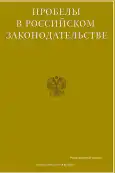On Some Problems of Improving the Criminal Legislation of the Russian Federation in Relation to Countering Terrorism and Extremism
- Authors: Kanokova L.Y.1
-
Affiliations:
- North Caucasus Institute for Advanced Studies (branch) of the Krasnodar University of the Ministry of Internal Affairs of Russia
- Issue: Vol 15, No 5 (2022)
- Pages: 124-128
- Section: Articles
- URL: https://bakhtiniada.ru/2072-3164/article/view/147603
- ID: 147603
Cite item
Abstract
The purpose of this research is the study of some gaps and shortcomings of the criminal legislation of the Russian Federation in relation to countering terrorism and extremism, and indicating the problem of the correct qualification of some crimes related to the studied phenomena, as well as the terminology used. The objectives of the study are the need to revise some of the punitive measures, and tighten them specifically in relation to crimes of a terrorist nature; it is indicated that it is important to understand the distinction between some concepts that are close at first glance, for example, terrorism as a broader concept and a terrorist act as one of the phenomena of terrorism, terrorist community and terrorist organization, distinguish between the concepts of extremist and terrorist activities, and most importantly, clearly distinguish between the phenomena of extremism and terrorism, since these phenomena complement each other and usually exist simultaneously. Conclusions: Extremism is a broader concept than terrorism, its determining factor is the motive, which can be associated with both religious and political aspects. The main thing is to determine the target for inciting intolerance and discord. Therefore, a significant gap in the legislation of the Russian Federation is the lack of classification of crimes of an extremist nature and the insufficient differentiation of their compositions. Since terrorism and extremism are two concepts that practically do not occur one without the other, their interrelation and complementarity is obvious. The problems of qualification of crimes are also indicated. Here are a few of them. Thus, the question of how to qualify a crime, separately for specific articles or for their totality, raises controversy. In this regard, the question of applying the correct judicial and investigative practice is raised, since, for example, classifying certain organizations as extremist or terrorist causes a wave of protests, as in the case of recognizing the extremist ‘Jehovah's Witnesses’ and the terrorist ‘Hizb ut-Tahrir’, whose representatives have not yet recognized the court’s decision as legal, but nevertheless are serving real terms in prison. The difficulty in this case is the fact that all members of such organizations become criminals, even those who really, in their minds, did not think about the occupation of illegal activities.
Keywords
Full Text
##article.viewOnOriginalSite##About the authors
Lyana Yurievna Kanokova
North Caucasus Institute for Advanced Studies (branch) of the Krasnodar University of the Ministry of Internal Affairs of Russia
Email: kanokova91@mail.ru
police major, lecturer of the special technical training department Nalchik, Russia
References
- Akhilgov A.M. Responsibility for extremist crimes // Young scientist. 2020. No. 40 (330). pp. 91-94.
- Akkaeva H.A. Some reflections on countering terrorism as a global problem of our time // Problems in Russian legislation. 2020 No. 1. pp. 145-146.
- Legislation on countering extremism: modernization is not required, but liberalization URL: https://ngo.midural.ru/news/show/id/3098/news_category/120
- Maistrenko G.A. The problem of distinguishing between the concepts of "terrorism" and "extremism" in the legislation of the Russian Federation // Public Service and Personnel. 2019. No. 4. pp. 132-135.
- Shamaev A.V., Gauzhaeva V.A. Features of the prevention of terrorism by internal affairs bodies // In the collection: Actual problems of law and law enforcement. Under the general editorship of V.A. Sosova. 2017. S. 147-153.
Supplementary files








